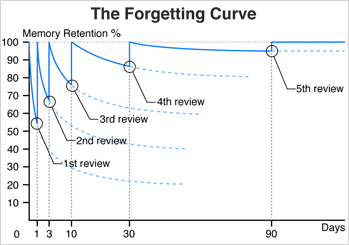* Study words related to your faculty using Okadai's KibiTango site.
* Study vocabulary at the Okadai Quizlet Page, or just click these links created by your teachers:
Study on your smart phone!
Science: Common Prefixes (接頭辞) Basic Science Chemistry Genetics Physics Energy
Edit these sets to make them better, or create more! Join the "Okayama University" class, click on a set, and click "Edit this Set". Change English definitions to Japanese.
TOEIC Service List:
After learning the most basic 2,800 words, research suggests that learning the 1,200 words on the TOEIC Service List may increase your coverage to 99% of words used on TOEIC (Browne, & Culligan, 2016 - info)
Study on your smart phone!
- Quizlet (see above)
- WordUp is an app that has you study the most useful words. There is video context, and you can review words to ensure you remember them. (It is free, but the pro version has a fee.)
- Memrise is one of the most popular apps to learn languages. Words are repeated at the good timing to ensure you memorize them. There is also listening, pronunciation practice, and speed games.
- NAWL Builder iPhone App is free and is recommended if you want to study abroad or go to graduate school.
Quizlet Example
Notes: * Change the study mode to play games >"Choose a Study Mode" on the bottom-right. Sign up to save your score or create your own sets.
Go to the Okadai Quizlet Page to study more sets.
- ReadLang can be used while and after reading. Install, and then you can translate words while reading by clicking a word. These words are then saved to your list, where you can study them later with flashcards.
Quizlet Example
Notes: * Change the study mode to play games >"Choose a Study Mode" on the bottom-right. Sign up to save your score or create your own sets.
Go to the Okadai Quizlet Page to study more sets.
Vocabulary Study Hints
Study Hint 1: if you study something only once, you may forget up to 90%! Review often! These sites help your review vocabulary with the most efficient timing: Memrise, WordUp, WordEngine (paid site), and this iPhone App.
Image from WordEngine.com Based on Hermann Ebbinghaus:
Study Hint 2: English has over 300,000 words, but we use 1% of them (the most common 3,000) about 90% of the time! Most words are not useful to learn, and if you learn them you may never use them again.... Focus only on common words or words related to your interests or needs!
To check if words are common, copy a text or word list into this >>website << and press "submit window". Words that are K-10 or higher (K-11, K-12, etc.) are probably not useful to learn (unless they are related to your needs or your TOEIC score is over 750). Off-list words are not useful (or, they are names or misspelled words).
Study Hint 3: Consider if you want a word in your active vocabulary (使える単語) or your passive vocabulary (分かるけど使わない). Our passive vocabulary is actually much, much bigger, and we don't need to learn to spell or use these words. Save study time by NOT worrying about the exact spelling, pronunciation, or grammar for these words.
For words you want in your active vocabulary, practice the spelling and notice the pronunciation. Also, understand the grammar (e.g. appropriate = 形容詞, appropriateness = 名詞, inappropriate...), and how the word is used in a dictionary.
> Practice writing sentences with the word.
> Practice pronunciation of the word you want. Go to this >>website<< using Google Chrome. Speak your words or sentences. Does the site recognize your pronunciation? (Does it dictate correctly?)
Study Hint 4: You will remember words more if you have an image in your mind. If you use Quizlet, add an image to it. You can also make a crazy sentences with words that sounds similar. For example:
synonym = 同義語 > There is no synonym for cinnamon.
(シナモンには同義語がありません。)